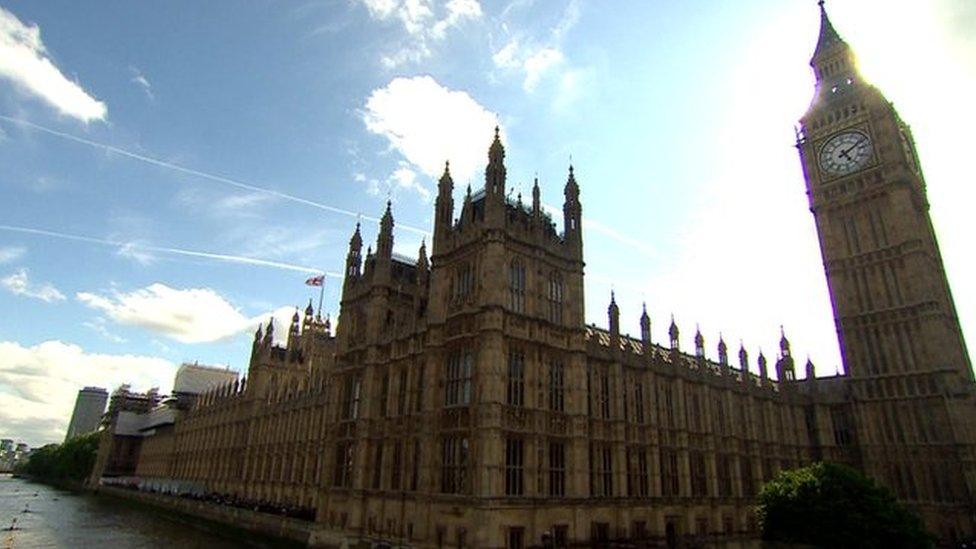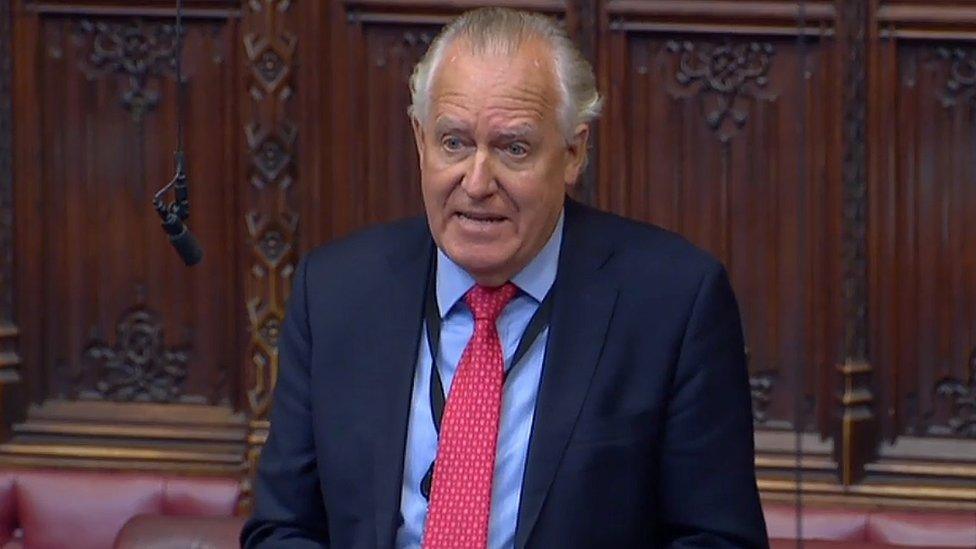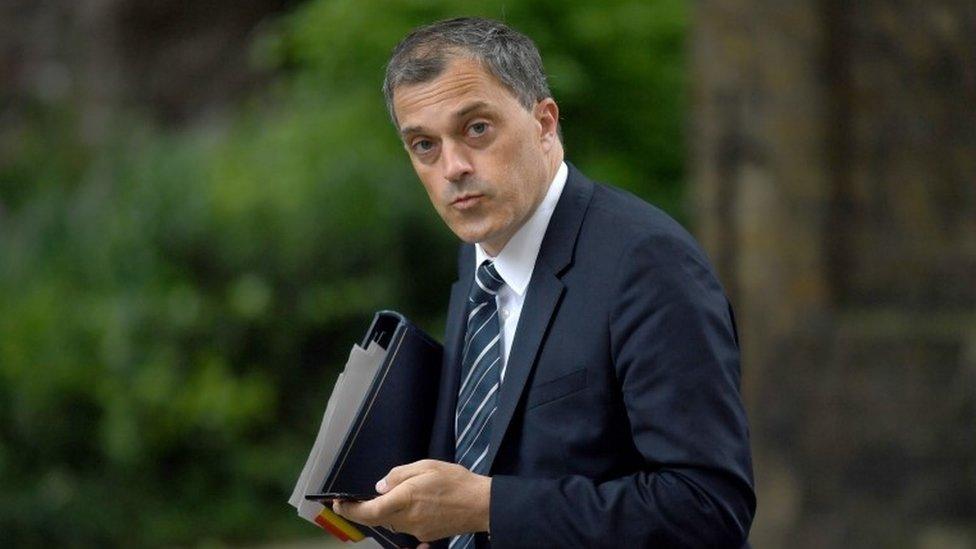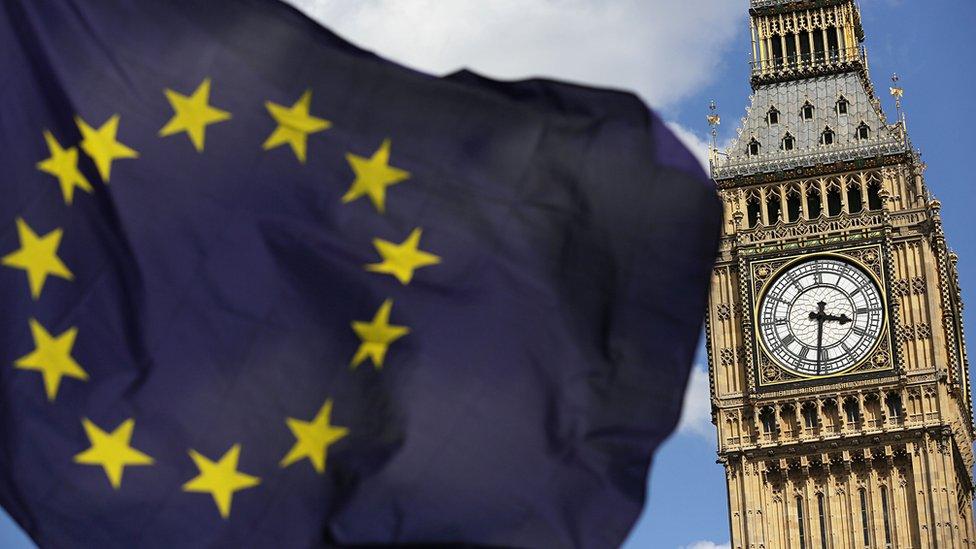UK government rejects call to stop fast-tracking NI laws
- Published

The government has rejected calls from a Westminster committee to stop fast-tracking legislation for Northern Ireland through Parliament.
The NI Affairs Committee recommended it be consulted before Number 10 used emergency procedures.
The Northern Ireland Office (NIO) responded to say there were urgent "unavoidable timeframes".
It comes amid fears a no-deal Brexit could lead to NI being governed by direct rule from Westminster.
This week, MPs have used the fast-tracking process to pass legislation seeking to delay a no-deal Brexit through parliament.
It means the various stages of a bill in both the House of Commons and the Lords are debated within a matter of days, rather than weeks or months.
Parliament is due to be suspended next week, returning a fortnight before the Brexit deadline, which some MPs say will cause problems for NI, where there is currently no devolved government.
Stormont's power-sharing government collapsed two-and-a-half years ago amid a bitter row about a green energy scheme, and Parliament has had to pass some key legislation for NI in the interim.
Two months ago, it used emergency measures to pass the Northern Ireland Act, which delays the government's obligation to call a fresh assembly election.
Allow X content?
This article contains content provided by X. We ask for your permission before anything is loaded, as they may be using cookies and other technologies. You may want to read X’s cookie policy, external and privacy policy, external before accepting. To view this content choose ‘accept and continue’.
But MPs were able to amend it to force the government to legalise same-sex marriage and liberalise abortion law in Northern Ireland, if devolution does not return by 21 October.
The government has also used the procedure to pass budgets for Northern Ireland, as well as legislation relating to the flawed Renewable Heat Incentive (RHI) scheme which caused the Stormont institutions to collapse in January 2017.
"No deal means direct rule"
Conservative MP Simon Hoare has been backed by former Cabinet Office Minister David Lidington in warning that if Stormont was not restored by 31 October, NI civil servants would not be able to take "any initiative" to off-set issues raised by a no-deal Brexit.
When Parliament is prorogued, it is effectively shut down, and there are questions about what might happen if the government needs to pass any urgent legislation to mitigate a no-deal Brexit in Northern Ireland.
The piece of legislation seeking to delay a no-deal Brexit is still being debated in the House of Lords.
During the debate, Lord Hain, a former NI Secretary, warned: "No deal means direct rule."
He told peers no-deal would mean the civil service would not have any legal powers left to "maintain contingency and security arrangements".

Peter Hain was secretary of state for Northern Ireland between 2005 and 2007
That chimes with what the current NI Secretary Julian Smith told the Commons on Thursday.
He admitted direct powers would need to be introduced "at pace", if it looked a no-deal Brexit was the likely outcome and talks to restore Stormont had not worked.
It also emerged Mr Smith had clashed with Boris Johnson about the government's prorogation plan.
Other government ministers including Michael Gove have conceded that re-introducing direct rule, in the event of no-deal, is a "real possibility".
'Challenging timeframes'
The Northern Ireland Affairs Committee has criticised the government for rushing legislation related to payments for claimants of the RHI scheme through parliament, without time for MPs to properly scrutinise it - and called for the practice to stop.
It argued that the committee should be informed before the legislation was fast-tracked.
But BBC News NI has seen the response from Julian Smith to the committee, rejecting the proposal, external.

Julian Smith became Northern Ireland secretary in July, having served three years as government chief whip
The NIO said the government understood the concerns of the committee "in relation to the speed with which NI legislation has been taken through the parliamentary process".
But it added: "Northern Ireland legislation at times understandably needs to respond to the urgency arising within the NI context.
"Sometimes this unavoidably requires timeframes that are very challenging for the government, the Northern Ireland Civil Service, and for parliament."
- Published29 August 2019

- Published28 August 2019

- Published10 July 2019
